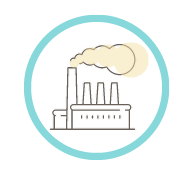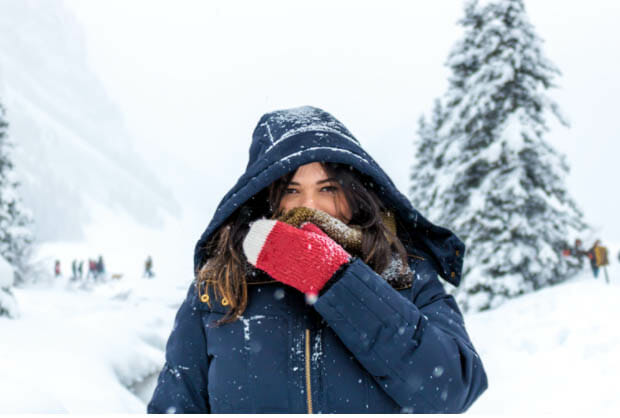
Winter is approaching…actually for many living in the Midwest, it’s already here! Though some of us look forward to the cozy nights in, with hot cocoa in hand in front of a warm fireplace, if you’re living with a chronic lung condition like bronchiectasis or COPD, your joy of the season may be mixed with unease or discomfort.
Between the colder temperatures and dryer air conditions, the winter months can make breathing more difficult, putting additional strain on your lungs: “For people with COPD, cold air can trigger spasms in the lungs, creating symptoms similar to an asthma attack…you also may feel a bit of tightness in the chest…” [1]
Cold, dry air can irritate your lungs, causing the upper airways to narrow [2]—and this not only affects people living with a lung condition. Everyone is prone to these symptoms. But if breathing is already a challenge, the impending winter season can cause a worsening of symptoms (i.e. flare up).
Ready for the good news? Protecting your lungs against the harsh, winter weather is possible! By working with your healthcare team, continuing your airway clearance therapy, and taking a few extra precautions, you can enjoy a safe season ahead!
Before we go into a few recommendations from the American Lung Association on how to protect your lungs this winter, let’s first discuss why cold air affects our lungs and other vital organs.
Why Does Cold Air = Chest Pain?
Whenever there is a sudden shift in temperature, our bodies react to keep us regulated. This is why we sweat in the summer, as our bodies are working overtime to keep us cool from extreme heat. In the case of cold temperatures, our bodies need to keep us warm, thus placing additional strain on our vital organs, including the heart and lungs.
When the air is cold, our blood vessels and arteries narrow in order to keep the heat inside our bodies. And in order for the heart to pump blood and oxygen through the newly constricted veins and arteries, our heart has to work harder, which can raise blood pressure [3].
High blood pressure in your lung arteries (also known as pulmonary hypertension) can affect the arteries carrying blood to the lungs and create chest pain [4].
Is Cold Air Causing My Cough?
When we breathe in air, it enters our bodies via one of two entry points: the nose or the mouth. Before the air reaches our lungs, however, these passageways work to warm and humidify the air, making it easier to breathe.
When we are fighting against cold or dry air, however, our nose and mouth have a harder time keeping this airflow warm. And when cold air enters into the airways, our lungs begin to tighten: “Cold air contains less moisture, and breathing it in can dry out the airways. This can cause the airways to spasm, triggering an asthma attack, which can involve coughing,” [5].
Why Am I Wheezing from Cold Air?
Speaking of less moisture, the dryness of winter can irritate your lungs, leading to increased symptoms of wheezing, coughing, and shortness of breath [6]. As our airways narrow, you might hear a whistling sound as you breathe in or out. This is the result of our narrowed walls vibrating [7].
Dry air can also cause us to experience dehydration, and since our bodies need fluid to produce mucus, which helps trap airborne bacteria, germs and dust, without that protective layer, we might be more prone to infection [8].
Best Climate for Lung Conditions
Hot and humid or cold and dry climates can create uncomfortable living conditions for someone living with a lung condition [9]. However, even if you live in a 70 degree climate with 40% humidity, there are always going to be other environmental factors that may impact your ability to breathe naturally.
Common airborne irritants that can impact your lungs include:
- Second-hand smoke
- Chimney fumes
- Outdoor air pollutants
- Aerosol products
- Insecticides
- Cleaning products
- Mold, dust and mildew [10]
Though there is no perfect climate condition for a lung disease, you can take steps to help prevent your condition from worsening, especially during the winter months.
If you’re traveling, at larger gatherings, or spending time outdoors this season, consider following these practices to further protect your lungs against potential infection:
Keep Your Nose and Mouth Covered: Covering your nose and mouth with a scarf can help protect against germs. This will also help warm the air before it enters into your lungs.
Watch the Forecast: Keep a close eye on the daily forecast for information on air quality. As air pollution tends to be higher in the winter, you’ll want to stay indoors if the Air Quality Index (AQI) increases to levels that are considered unhealthy for individuals living with a chronic lung condition.
Aside from the bitter outdoors, indoor air conditions can also be harmful for someone living with bronchiectasis. Whether you or a loved one is experiencing symptoms of bronchiectasis, here are some ways to prevent inflammation and ensure that everyone has a wonderful holiday season this year:
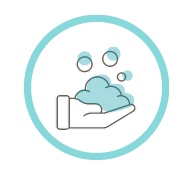
Wash Your Hands: A general rule of thumb but always effective, washing your hands reduces the chances of spreading germs. Especially as gatherings are often met with warm embraces from friends and family, be sure to keep your hands clean and ask others to do the same.
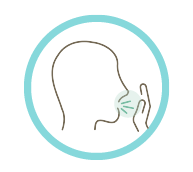
Avoid People with Colds: People living with bronchiectasis or other chronic lung conditions are more susceptible to colds and infections. If you’re experiencing early signs of a cough or sore throat, keep your distance from others, especially if you have a family member living with bronchiectasis.
 Skip the Scented Household Products: Lighting holiday-themed candles may smell pleasant and set a cozy mood, but they can also irritate a person’s lungs. If someone with a chronic lung condition is visiting, avoid using scented air fresheners or strong candles that create difficult breathing conditions.
Skip the Scented Household Products: Lighting holiday-themed candles may smell pleasant and set a cozy mood, but they can also irritate a person’s lungs. If someone with a chronic lung condition is visiting, avoid using scented air fresheners or strong candles that create difficult breathing conditions.
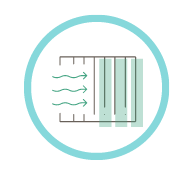 Keep Your Indoor Air Clean: In a previous blog post, we discussed tips for creating a safer breathing environment inside your home. In addition to using those tips, remember to avoid using a burning stove or chimney, as this can spread pollutants and dust particles around the room, making it harder for someone with bronchiectasis to breathe.
Keep Your Indoor Air Clean: In a previous blog post, we discussed tips for creating a safer breathing environment inside your home. In addition to using those tips, remember to avoid using a burning stove or chimney, as this can spread pollutants and dust particles around the room, making it harder for someone with bronchiectasis to breathe.
 Stay on Track with HFCWO Therapy: Travel, shopping, baking, and spending time with family is all part of the seasonal charm, but it can be time consuming. No matter how busy your plans are this season, always put your bronchiectasis management first.
Stay on Track with HFCWO Therapy: Travel, shopping, baking, and spending time with family is all part of the seasonal charm, but it can be time consuming. No matter how busy your plans are this season, always put your bronchiectasis management first.
Therapy is typically performed twice a day for 30 minutes, but you can perform each session while still spending time with loved ones.
Ready to Make SmartVest a Part of the New Year?
If you haven’t experienced the benefits of using The SmartVest Airway Clearance System to help manage bronchiectasis or COPD, make 2022 the year you say “yes” to symptom relief.
To learn more about SmartVest, request an informational packet from us today! You can also speak with one of our patient care advocates to ask questions and get the facts about airway clearance and tips on how to talk to your doctor.
Contact them directly at 1.855.528.5690, or schedule a time at the link below and they will call you.
Resources
[1] Cleveland Clinic. “How Cold Weather Can Spell Trouble for Your Heart and Lungs.” Retrieved from https://health.clevelandclinic.org/how-cold-weather-can-spell-trouble-for-your-heart-and-lungs/
[2] Harvard Health Publishing. “7 Strategies to Fight Winter Breathing Problems.” Retrieved from https://www.health.harvard.edu/staying-healthy/7-strategies-to-fight-winter-breathing-problems
[3] Mayo Clinic. “Blood Pressure. Is It Affected by Cold Weather?” Retrieved from https://www.mayoclinic.org/diseases-conditions/high-blood-pressure/expert-answers/blood-pressure/faq-20058250
[4] Mayo Clinic. “Chest Pain.” Retrieved from https://www.mayoclinic.org/diseases-conditions/chest-pain/symptoms-causes/syc-20370838
[5] Medical News Today. “What to know about cold-induced asthma.” Retrieved from https://www.medicalnewstoday.com/articles/325492
[6] American Lung Association. “Weather and Your Lungs.” Retrieved from https://www.lung.org/blog/weather-and-your-lungs
[7] Medical News Today. “What’s the difference between expiratory and inspiratory wheezing?” Retrieved from https://www.medicalnewstoday.com/articles/325370
[8] Cleveland Clinic. “How Dry Winter Air Can Cause Respiratory Problems— From Bronchitis to Nosebleeds.” Retrieved from https://health.clevelandclinic.org/can-best-combat-effects-dry-winter-air/
[9] American Lung Association. “Weather and Your Lungs.” Retrieved from https://www.lung.org/blog/weather-and-your-lungs
[10] Cleveland Clinic. “5 Tips to Help You Breathe Easier in Hot or Cold Climates.” Retrieved from https://health.clevelandclinic.org/5-tips-to-help-you-breathe-easier-in-hot-or-cold-weather/

